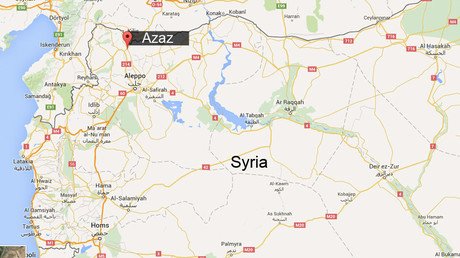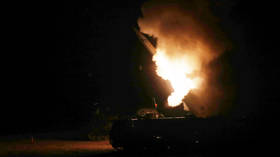‘Terrorists facing endgame’: Are Turkey & West looking for pretext to start ground op against Assad?
As Syrian anti-Assad militants are getting desperate amid Damascus’ Russia-backed advance, world powers that want regime change in Syria are looking for ways to avert their defeat, Jim Jatras, former US diplomat and GOP Senate policy adviser told RT.
Despite the latest agreement of world powers in Munich, Germany on bringing an end to hostilities in Syria, Turkey and Saudi Arabia are apparently preparing to step up their military activity in the region, as US Secretary of State John Kerry is yet again pushing for Syrian President Bashar Assad to go as a precondition for political transition. RT asked Jatras to comment on what is being played out there.
READ MORE: Assad says sees risk of Turkey, Saudi Arabia invading Syria
RT:Why is Kerry saying Assad must go so soon after the Munich agreement, because during that deal it was stressed the need for all parties, including Assad, to talk?
Jim Jatras: Well he certainly doesn’t have any basis to say the vast majority of the Syrian people want Assad to go. Certainly, there’s a very large percentage of the Syrian people, perhaps a majority, who definitely want Assad to stay, if the alternative is some sort of Sharia-ruled sectarian Sunni state. As far as what he’s saying still, that Assad must go – he’s got a lot of pressure from our so-called allies in the region, particularly the Saudis, the Turks, and the Gulf states, for whom removal of Assad and regime change remain their only real interest in this fight. And frankly, they’re getting desperate. They see the advances being made by the Syrian army with Russian air support, and they see that the terrorists are facing what could be endgame, and they’re trying to find some way to pull a rabbit out of the hat.
RT: It might seem logical, though, to many people, if an agreement is reached, if there were elections at the end of all this, it would be up to the Syrian people to decide who should run the country. If John Kerry is saying that he believes the majority of people are against him, then surely he’d just get voted out, wouldn’t he?
JJ: One would think, but apparently that’s not good enough. That we have to make an a priori judgment as to who the real popular leadership would be, and what’s the prospect of that? That was the line we took in saying Muammar Gaddafi must go, Saddam Hussein must go, and look how well that turned out.
RT:We’re seeing some international powers such as Turkey and Saudi Arabia saying that ISIL [Islamic State / IS / ISIS] actually can’t be defeated while Assad is in power. What’s the logic to that argument?
JJ: There is no logic. It’s, in fact, quite the opposite. Unless the Syrian state can be stabilized, and then if we see what the Syrian people want to decide about the future, that’s one thing. But until Syria is stabilized and the terrorists are defeated, and remember, it’s not just Daesh [Arabic pejorative term for IS], it’s Al-Nusra [Front], it’s Jaysh al-Islam, it’s Jaish al-Fatah – it’s all these terrorist groups, some are more radical than others, however you measure that, most of whom, let’s never forget, are not even Syrian. Until these people are defeated, and preferably killed, there’s simply no way that any kind of reasonable life can be put back together for the Syrian people.
Turkish, Saudi troops in Syria would be ‘catastrophic’ (Op-Edge) https://t.co/dsBmawi5Ezpic.twitter.com/hD87iWOZrW
— RT (@RT_com) February 13, 2016
RT:And in the shorter term, what are the chances of actually getting a lasting ceasefire? We’ve heard there’s going to be cessation of hostilities, but actually turning that into anything meaningful, like a ceasefire – that seems far, far away.
JJ: It does. And let’s again keep in mind this is reflective of the desperation I spoke of earlier. If Aleppo is about to be liberated by the Syrian army, if the terrorist corridor to Turkey is in danger of being closed, it is something possibly close to endgame for the regime-change-based powers. That’s why they want some kind of a ceasefire, and that would give them a new lease on life, they hope. And also, let’s never forget, the prospect of some kind of a provocation, like we saw in Ghouta with chemical weapons in 2013, like in Racak in Kosovo, Srebrenica in Bosnia, where they could accuse the Syrian army or the Russian air force of some horrible humanitarian catastrophe that warrants some kind of intervention.
READ MORE: Saudi jets to fly missions in Syria from Turkish base
RT:Just on that point, the CIA has said that ISIL, it believes, is using chemical weapons, so surely that strengthens the case for everybody to fight ISIL together, doesn’t it?
JJ: One would think. And remember, the idea that the anti-government forces have chemical weapons is certainly not new. We knew that as long as two years ago. I think the real danger there, is that it would be used as a pretext for some kind of intervention ostensibly against Daesh, but the real objective would be the Syrian government and President Assad.
#ISIS used chemical weapons, may have more - #CIA chief https://t.co/EMzhBKl0Wnpic.twitter.com/VArQQVNKza
— RT (@RT_com) February 12, 2016
The statements, views and opinions expressed in this column are solely those of the author and do not necessarily represent those of RT.













